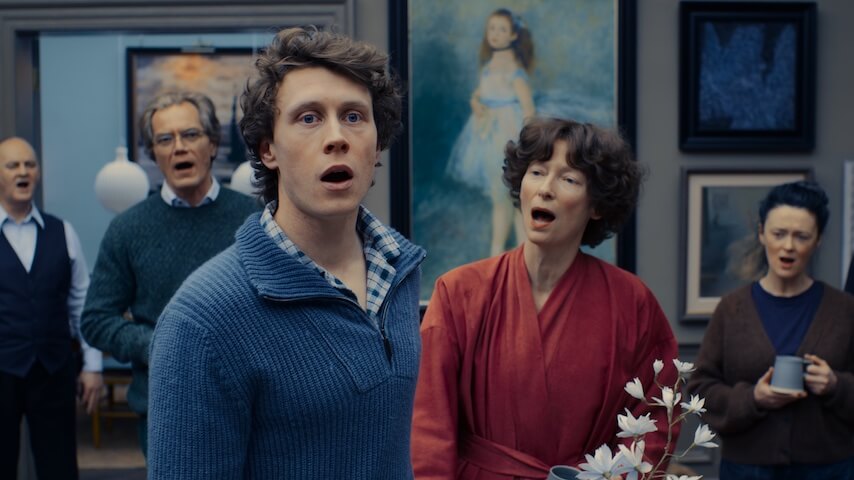The elite sing off-key at humanity's curtain call in The End
It's the end of the world in Joshua Oppenheimer's post-apocalyptic musical, and the survivors navigate their capitalist guilt through clunky song.
Photo: Neon
The theatricality of evil has dominated filmmaker Joshua Oppenheimer’s career. The first film in his pair of brutal, phenomenal documentaries—The Act Of Killing and The Look Of Silence—turned the genocide in Indonesia from 1965 – 1966 into broad performance pieces reenacted by the actual perpetrators of those mass killings. The second watches killers squirm under interrogation, their ghoulish self-mythologizing shrinking away under the spotlight. Oppenheimer makes his narrative debut with another near-farce about the lies people tell themselves to get through the day. The End isn’t a musical about murderers with bloody hands, but about a fossil fuel magnate’s family a few steps removed from the dirty work. They survive the post-apocalypse in a bunker, singing clunkily about their guilt, their present, their future.
The artifice is all around them—literally. Mother (Tilda Swinton) and Father (Michael Shannon) twirl about their well-appointed corner of a salt mine, seasonally redecorating the walls with fine art that they’ve smuggled down into the bowels of the earth with them. The couple and their live-in friend-servants (Bronagh Gallagher, Tim McInnerny, Lennie James) put on a daily performance of normalcy for the 20-going-on-12-year-old Son (George MacKay), who was born in the shelter. He’s only ever known life after the world ended, making him a particularly pliable subject to carry on the human race—and a perfectly unquestioning audience.
It’s a slight satire, the criticism lodged as much in the fantastical form as the thin content. Even if Father’s main hobby wasn’t dictating a revisionist biography to his Son, the idea that the people who ruined things also hold the power to rewrite the history around who ruined things runs amok in The End. Unexpectedly, so does someone outside of this bubble: a Girl from the outside (Moses Ingram), who stumbles into their hideout, led there by the survivors’ smoke. (Even after a climate disaster, they’re still taking the atmosphere down a peg.)
Her arrival offers the 148-minute film’s main point of plot tension, though even her probing questions poking at the family’s constructed reality barely seem to quicken anyone’s pulse. Soon enough, she’s paired up with Son, and assimilated into the family unit. Oppenheimer and his co-writer Rasmus Heisterberg dodge any questions of race that may come up when a Black woman, born into whatever hellscape lies above ground, arrives into the ultimate space of white privilege, and opt for brief awkwardness over meaningful confrontation. This may reflect the deny, deny, deny ethos of the rich head-buriers, but it also keeps the tiring film treading water.

















![HBO teases new Euphoria, Larry David, and much more in 2026 sizzle reel [Updated]](https://img.pastemagazine.com/wp-content/avuploads/2025/12/12100344/MixCollage-12-Dec-2025-09-56-AM-9137.jpg)






















